Without consent, what have you got?
Just force.
The Constitution articulates the principle of consent – that “the people” agree to its terms and conditions – to be governed by it – and that without their consent, the government has no legitimate claim to govern them.
This is the principle at the bottom of the debate over medical marijuana – as well as the debate over recreational marijuana. If the people of a state consent to it, by what right does the federal government oppose it?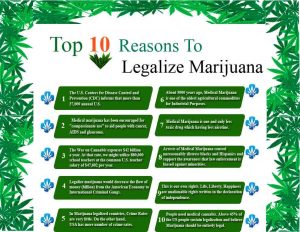
And it’s actually just one Fed – the attorney general of the United States, Jeff Sessions. He has personally decided to hurl thunderbolts and lightening at any state which dares to abide by the will of its people by decriminalizing the possession, sale and use of marijuana – whether for medical or recreational purposes. He has decreed that he – personally – will send federal hellhounds to prosecute those who legally – insofar as the laws of their state are concerned – defy his personal anti-pot animus.
But, he needs the funds to do so.
Mao was wrong. Power does not flow from the barrel of a gun. It emanates from the pockets of those with the money to buy the guns.
Take away the money and – effectively – you take away the guns.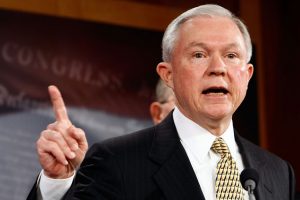
That’s what Libertarian leaning Rep. Dana Rohrabacher of California did back in 2014, when he put a rider in a funding bill that prohibits the DOJ’s inspector Javerts from going after marijuana users and sellers in states that have legalized the same – by denying them the funds to jihad.
Cue the angry ululations from Sessions. He is stomping his feet, demanding that the funding restriction be rescinded. He believes in the consent of the governed as much as another Republican – Abe Lincoln did.
And like Abe, he is determined to use force to impose his will upon those who do not consent.
But what gives the attorney general – or any other person – the moral right to deny consenting adults access to marijuana for medical or any other reason?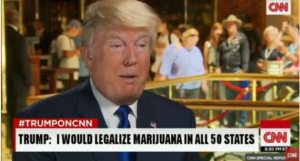
That Sessions does not personally like marijuana – and chooses not to use it himself, for health or any other reason – is certainly his right. There are people who feel the same way about alcohol – but these lack the power to impose their arbitrary preferences on others .
They did, of course, once possess it.
For about 13 years – from 1920 to 1933 – there was a federal ban on the manufacture, possession and consumption of alcohol. This was Prohibition – and it was a disaster for the country in addition to an insufferable affront to the founding principles of the country. A minority of zealots traduced the will of the people and criminalized personal choices which, as such, imposed no harm on any other person.
The Prohibition of alcohol was regarded with contempt from its inception and flagrantly ignored. It is an axiom of common sense that any law which most people contemptuously disobey and – more to the point – which they do not fault others for disobeying – can be safely assumed to be a stupid and even evil law.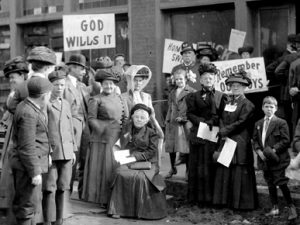
Such laws turn legitimate law on its head – transforming people who are’t criminals in the moral sense (i.e., people who hurt others by their actions) into technical foul criminals – while turning the government into a criminal enterprise.
One which – in our time – seizes people’s property without even formal charges being filed, let alone convictions obtained – solely on the basis of an assertion by law enforcement that an “excessive” amount cash was found in a person’s possession; this is presumptively considered illicit “drug” money.
One which puts tens of thousands of people in manacles ad cages every year, for nothing more than possessing – or using or selling – a plant.
The only thing missing is a gaggle of demented harpies singing Onward Christian Soldiers.
The people of 29 states – so far – have had enough of this. Have passed laws decriminalizing the use, possession and sale of marijuana. Their actions are constitutional in both the moral as well as the legal sense of that document. The people are supposed to be the final arbiter of government – of what is and is not permissible.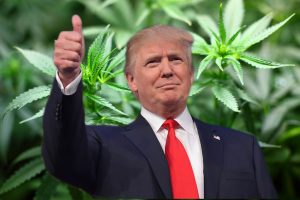
President Trump, who is no Libertarian, agrees with this principle. “I really believe we should leave it up to the states,” he has said on several occasions.
Which means, leave it up to the people of the states.
This however puts him at odds with his ululating attorney general, who is pushing hard for the elimination of the 2014 law which denies the DOJ funds to pursue federal-level prosecutions of marijuana users in states which allow it. Sessions justifies his demands for federal usurpation by arguing that there is “an historic drug epidemic and a potentially long-term uptick in violent crime.”
This, of course, is nonsense.
Sessions cannot point to any “epidemic” in violent crime – current, let alone projected – that can be laid at the feet of medical or recreational marijuana, except insofar as use/possession/manufacture have themselves been criminalized. Which is exactly of a piece with the 1920s-era criminalization of the use/possession/manufacture of alcohol.
It amounts to the manufacture of “crime” in keeping with the dictum of Stalin’s enforcer, Lavrenty Beria.
If the argument is that because some people abuse marijuana, get high and drive or steal to support their habit, etc. – those arguments apply several-fold to alcohol. People who use alcohol responsibly, without harming anyone else, are no longer treated as criminals. Why should people who responsibly use marijuana be treated as if they were? By what logic?
And by what right?
Trump was elected over the harridan Hillary because – his flaws conceded – he better represented the people, who voted for him rather than his crazy eyes opponent. The people voted for Trump because he promised to do what the people wanted. Not a handful of arrogant bureaucrats in Washington – acting contrary to the will of the people.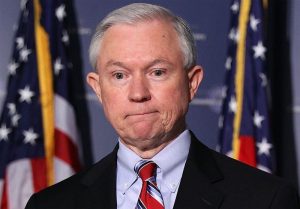
The idea that the will of a single man – Sessions – should trump the will of the people is obnoxious as well as contrary to everything the Constitution is supposed to be about.
When Trump signed the omnibus spending bill that funded the government last summer, he stated: “Division B, section 537 provides that the Department of Justice may not use any funds to prevent implementation of medical marijuana laws by various States and territories. I will treat this provision consistently with my constitutional responsibility to take care that the laws be faithfully executed.”
Italics added.
Hooray.
On this issue, at least, the president gets it. As opposed to his AG, who seems to think it’s 1920 – and that America should be governed not in accordance with the will of the people but from the top down by unelected “czars” such as himself.
. . .
Got a question about cars – or anything else? Click on the “ask Eric” link and send ’em in!
If you like what you’ve found here, please consider supporting EPautos.
We depend on you to keep the wheels turning!
Our donate button is here.
If you prefer not to use PayPal, our mailing address is:
EPautos
721 Hummingbird Lane SE
Copper Hill, VA 24079
PS: EPautos magnets – they’re back! are free to those who send in $20 or more to support the site. Also, the eBook – free! – is available. Click here. Just enter you email in the box on the top of the main page and we’ll email you a copy instantly!


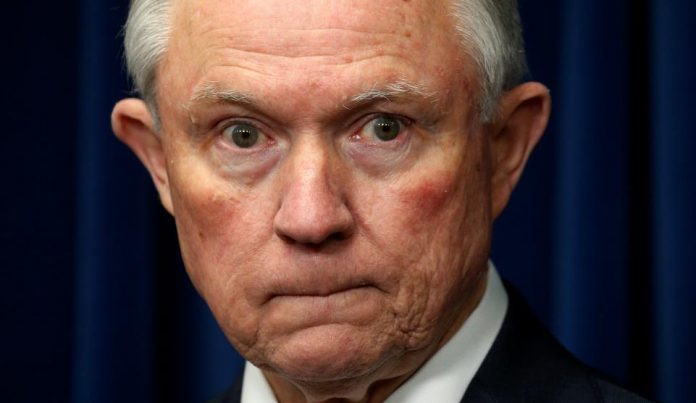









Sessions is vile. Of course one of Trumps first appointees. He was full on for civil asset forfeiture for the two years he as there and trump could give a fuck as usual as he played on his phone.
As David Knight has said many times on his show (catch it Mon-Fri 9-12 Eastern Time at banned.video), we won’t get our liberty back by trying to go through Washington; if we get it back, it’ll be at the local and state level, such as states legalizing marijuana.
This seems an overblown problem, according to this story: https://news.wgbh.org/2018/01/05/local-news/sessions-marijuana-order-allows-prosecutors-go-after-pot-it-doesnt-mandate-it
Snippet:
“Gertner thinks the move by Sessions is more symbolic than real, adding that some prosecutors could crack down harder in states that haven’t legalized the drug, but that it’s very unlikely to happen in a jurisdiction that favors legalization.
“You can make it a priority, I suppose under the Sessions guidance, but nobody will, particularly in the states in which marijuana is legal,” Gertner said.
Braintree Rep. Mark Cusack, the House Chairman of the Legislature’s marijuana committee, is skeptical that federal courts could keep up with marijuana cases should the Sessions Justice Department start prosecuting federal drug laws in places with clear legalization on the state level.
‘It might be more of a mission statement than an actual new government policy that’s on the ground and effective. And it flies in the face of why voters wanted to legalize it, [which] is to get it out of the black market, to have it regulated and taxed,” Cusack said.
Alternative website ad network
COMMODITY AD NETWORK
A disruptive ad network of creative minds who speak out against the powers that be.
https://commodityadnetwork.com/
Join as an Alt-Media Website
https://commodityadnetwork.com/content-creator/
My family, methodists all, are very much against consumption of alcohol and recreational drugs. I suppose that’s ok, they’re entitled to their opinion. They are very quick to point out the downside of drugs without really understanding what they are beyond the cartoon caricatures portrayed by the media. I’m certain if Pennsylvania had a ballot initiative to legalize pot they’d vote against it. I’ve brought up the whole freedom aspect with them, since they’re also pretty much 2nd amendment junkies too. “Well, that’s not the same!” and “They’re pushing it on children!” But to keep the peace I usually let it go. My sister’s husband points out that the people consuming these substances to excess usually don’t have control over themselves. That might be true, but I’ve been around enough drunks and stoners to know that they’re also quite social and almost always have someone watching out to make sure they get home ok (like me).
I, of course, voted in favor of amendment 64 when it came up in 2012. I’m fairly certain it was only put on the ballot to get out the conservative vote, since it was pretty much a done deal that Obama would win the state thanks to Mitt “Milquetoast” Romney’s lack of electability. No one supported the amendment. I mean no one. No Democrat, no Republican, no media, no one. Except us. We recognized the hypocrisy of keeping pot illegal when the official state song is Rocky Mountain High “Friends around the campfire and everybody’s high” is a little on the nose, don’tcha think? We saw what it did to minority and low income families. And I think a bunch of old hippies remembered the good old days and realized they went on to have normal lives, so maybe their grandkids will turn out ok too.
I think the prohibitionists really don’t understand the reality of drug use. They don’t get how rampant it is, they don’t get that the impact is usually way overstated and they don’t get that it’s very likely they know someone who is a regular consumer of recreational drugs, even though they don’t look or act like Tommy Chong. And just like every other justification for limiting freedom they’re only going to discuss the far ends of the bell curve since that’s the only way to scare everyone into compliance.
I suspect Big Pharma is behind this, since marijuana can be a safer alternative to opioids for pain relief. All the hand wringing about the “opioid crisis” conveniently ignores the billions raked in by pharmaceutical companies selling their addictive pain killers.
I don’t think so. Maybe they’re on board as an added benefit to get campaign funds, but I’ve met lots of people who are truly afraid of any mind-altering chemicals. They’re usually surrounded by like minded religious (protestant) associates, who are quick to point out the “success” of Alcoholics Anonymous and how finding God is paramount to living a rich full life away from sin (as defined by the protestants). The Republican party is lousy with them (thanks to Nixon) and they’ve been the primary reason for Republican middle America wins since Bush the first lost to Clinton. They’re every bit as delusional as anyone on acid but they’re permanently in that altered state. Maybe there’s something in the communion wafers…
Hi RK,
This business shows how little many Republicans grok the concept of liberty – their constant use of the term notwithstanding….
It’s like being governed by Tammy Fay Baker. Or nurse Ratched.
Big Pharma tag teaming with Big Ag will end up co-opting and swallowing legal weed. They’ll push for legalization, enter the market and successfully lobby for legislation that makes it impossible for smaller players to compete. They’ll genetically modify the plant and patent it. The laws allowing people to grow their own will go away, and all the new legalization going forward will prohibit home growing. You’ll be able to buy all the weed you want, but the money will all go to Merck and Monsanto. The prison industrial complex will still be putting people away for marijuana “crimes” such as growing your own, unlicensed distribution and patent infringement, much like they do people who dare to distill alcohol.
Agreed Mike, I just read an article this morning stating Big Pharma’s own study has them losing 18 billion per year if marijuana is legalized across the country:
http://healthimpactnews.com/2018/big-pharma-stands-to-lose-18-5-billion-if-marijuana-is-legalized-nationally-is-this-why-the-current-administration-is-attempting-to-halt-the-progress-of-medical-cannabis/
The US is a police state now. Americans should be out in the streets with pitchforks and torches, but instead they would rather shut up, cover their ears, and put their heads in the sand.
Weird.
http://f2bbs.com/bbs
Sessions is a ridiculous spinster aunt giving marital advice.
It took a CONSTITUTIONAL AMENDMENT to outlaw alcohol…it another CONSTITUTIONAL AMENDMENT to “re-legalize it. Why not the same for “drugs or other “mal prohibitum” substance?
Great question. Here’s the answer: In 1919 when the 18th Amendment was ratified, people still took the Constitution seriously. They realized that Congress had no authority to outlaw liquor without an amendment.
Fast forward 15 years to FDR’s New Deal. Roosevelt and his Democrats wanted to create a centrally-planned “command economy,” but that pesky Constitution stood in their way. Knowing full well that he could not get amendments to grant him the dictatorial powers he wished, Roosevelt and his Democratic Congress began to rely upon a tortured interpretation of the “elastic clauses” to allow them to do whatever they wanted. The Supreme Court struck down much of his New Deal legislation, so he attempted to “pack” the Court in 1937 by proposing the addition of six new seats — which, of course, he would get to fill. That never happened, but the Court “saw the light” and began to uphold New Deal legislation based on very, VERY loose interpretations of the Constitution.
Of particular importance to the marijuana question is the 1942 case Wickard V. Filburn, in which the Court upheld such a tortured interpretation of the “interstate commerce clause” so as to render it practically meaningless and grant Congress completely unchecked powers.
The facts of the case are truly bizarre. Filburn a farmer in Ohio, was fined by the U.S. Department of Agriculture for exceeding his wheat quota, which had been set by Congress in the Agricultural Adjustment Act — a law which intended to fix national farm commodity prices. Filburn argued that he grew the wheat on his own private property and used it to feed his livestock in his own barn. He never sold the wheat, it never left his private property, and it never crossed state lines — therefore, he claimed, Congress had absolutely no jurisdiction over his actions under the interstate commerce clause.
Sounds like a slam-dunk defense, right?
But Filburn LOST the case. The Court ruled that — get this!!– Filburn’s FAILURE TO BUY WHEAT to feed his livestock on the open wheat markets had an “EFFECT” on interstate commerce; therefore the fine was upheld!
So, the Court essentially held that ANY action that had ANY tangential effect on “interstate commerce” could be regulated. And this interpretation was subsequently used to justify Federal narcotics laws claiming jurisdiction over users who remained wholly within the boundaries of a given state, or even wholly on private property.
Federal gun laws are justified in a similar fashion. Right now there is a major legal battle shaping up with the states that have legalized marijuana and Supreme Court precedent that has stood for nearly 80 years.
I think that Wickard should be overturned… and I also think that pro-gun, “Red” states ought to start taking the same approach that the marijuana-legalizing states are taking and tell the Feds to shove their gun laws up their asses.
Great history lesson. This is why it is so important to understand our past. Without understanding how we got here, we don’t have the map to move where we want to go. The twisting of the Commerce clause is such a perversion of the intent of the Constitution that I’m sure that the Founding Fathers are rolling in their graves. It is truly a travesty. The good news is that in Gonzales vs. Raich the dissent written by Justice Thomas made exactly the argument that the Commerce clause should not be applied to activity that is neither interstate nor commerce. Just the fact that the idea is being put forth on the SCOTUS is reason for hope (even if it was the dissent) . I believe that the real progress is made on the state level and once enough people are on board with an idea, like legal marijuana, there is little that the federal government can do about it. There is a part of me that actually hopes that Sessions starts prosecuting marijuana cases in states where it is legal so that we can have this fight.